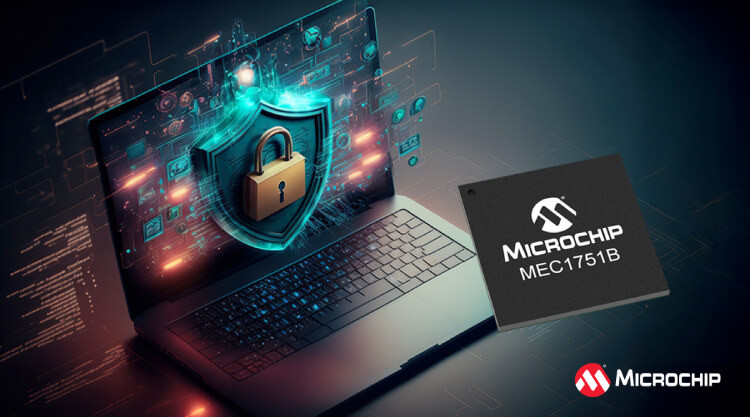Microchip Adds Quantum Resistance to Embedded Controllers
Buyer News | 19-05-2025 | By Matthew Walker

Key Things to Know:
- Microchip’s MEC175xB embedded controllers are designed with NIST-approved post-quantum cryptographic algorithms, including ML-KEM, ML-DSA, and LMS.
- These algorithms are implemented in immutable hardware, offering a higher level of security compared to software-based solutions.
- The controllers support CNSA 1.0, CNSA 2.0, and hybrid secure boot configurations, enabling a flexible path toward quantum readiness.
- Powered by a 96 MHz Arm Cortex-M4F core, the MEC175xB offers robust performance, low power consumption, and developer support through MPLAB X IDE and Zephyr.
Driven by rapid advancements in cryptographic research and the increasing urgency to secure embedded systems, security products with post-quantum cryptography are becoming a critical area of focus for hardware manufacturers.The National Security Agency (NSA) has introduced the Commercial National Security Algorithm Suite 2.0 (CNSA 2.0) to define quantum-resistant standards, urging sectors such as data centers and computing to adopt post-quantum-ready solutions within the next two years.
This transition reflects growing awareness of the potential for future quantum-based attacks to compromise existing asymmetric cryptographic systems. As industries prepare for a new era of security requirements, manufacturers must begin integrating next-generation cryptography into their platforms without sacrificing legacy functionality or performance.
In response, Microchip Technology has launched the MEC175xB family of embedded controllers, designed to meet emerging post-quantum demands. With built-in support for NIST-approved algorithms and a modular, power-efficient architecture, the MEC175xB series enables OEMs to begin building quantum-resilient systems today.
Hardware-Based PQC: Inside the MEC175xB Controller
The MEC175xB family incorporates several post-quantum cryptographic algorithms standardized by the National Institute of Standards and Technology (NIST), including Module-Lattice-Based Digital Signature Algorithm (ML-DSA), Module-Lattice-Based Key Encapsulation Mechanism (ML-KEM), and the Leighton-Micali Signature (LMS) scheme. These algorithms are designed to withstand quantum attacks that could potentially break traditional cryptographic systems such as RSA or elliptic curve cryptography.
Unlike software-based implementations that are more vulnerable to tampering or reverse engineering, Microchip has implemented these PQC algorithms in immutable hardware. This approach significantly enhances security by reducing attack surfaces and ensuring that critical cryptographic functions remain fixed and protected throughout the product lifecycle.
Security features extend beyond algorithm selection. The MEC175xB controllers offer a secure boot process and secure firmware updates configurable for CNSA 1.0, CNSA 2.0, or a hybrid approach. Additionally, attestation capabilities leverage ML-DSA for cryptographic signing and key generation, helping validate system integrity and authenticity during device operation and updates.
Performance, Power, and Developer Enablement
Beyond its security features, the MEC175xB controller is engineered to deliver strong computational performance while maintaining efficient power consumption—key requirements for embedded applications. At the heart of the device is an Arm Cortex-M4F processor running at 96 MHz, supported by a Memory Protection Unit (MPU) to help isolate and safeguard critical software processes.
The controller includes 480 KB of SRAM and offers a variety of connectivity options to support flexible system integration. These include I3C host and client interfaces, an advanced Enhanced Serial Peripheral Interface (eSPI), and an optional Full-Speed USB 2.0 interface. Together, these features make the MEC175xB well-suited for a range of applications spanning data centers, industrial control systems, and endpoint security devices.
To support developers, Microchip has aligned the MEC175xB family with its MPLAB X Integrated Development Environment (IDE) and provides example projects through the Secure Document Extranet. Additional compatibility with external tools like Zephyr further simplifies prototyping and accelerates development. Hardware evaluation is enabled through the MEC1753-240 MECC development board, allowing engineers to validate post-quantum implementations in real-world scenarios.
Implications for Embedded Security and What’s Next
As the cybersecurity landscape continues to evolve, Microchip’s MEC175xB controllers represent a significant step toward building resilient embedded systems that can withstand the threat of quantum-enabled attacks. By integrating post-quantum cryptography directly into immutable hardware, the company provides a practical and forward-compatible solution for OEMs navigating increasingly complex security requirements.
The early adoption of CNSA 2.0-compliant cryptographic methods positions the MEC175xB family as a key enabler for industries preparing to meet government and enterprise-level security standards. At the same time, the ability to support hybrid CNSA 1.0 and 2.0 configurations offers a flexible path for organisations with existing infrastructure to transition gradually without losing compatibility.
With these new embedded controllers, Microchip is not only addressing immediate concerns around post-quantum readiness but also laying the groundwork for the next generation of secure computing platforms. As demand for quantum-resilient security grows across sectors such as data centers, industrial automation, and critical infrastructure, the MEC175xB series offers a robust foundation on which engineers can confidently build.
About Microchip: A Legacy of Embedded Innovation
Microchip Technology Inc. is a globally recognized leader in smart, connected, and secure embedded control solutions. With a track record spanning decades, the company has consistently delivered reliable, scalable technologies that power everything from everyday consumer devices to mission-critical infrastructure.
Its broad portfolio serves a diverse range of market verticals, including automotive, industrial automation, aerospace and defense, communications, and data center infrastructure. Microchip’s embedded controllers, microprocessors, and security products are trusted by over 100,000 customers worldwide for their robust performance, long-term reliability, and efficient development tools.
Headquartered in Chandler, Arizona, Microchip is known for its strong focus on technical support, long product lifecycles, and dependable supply chains. This commitment to partnership and delivery continues to make it a trusted provider in an increasingly security-conscious and fast-evolving technology landscape.

